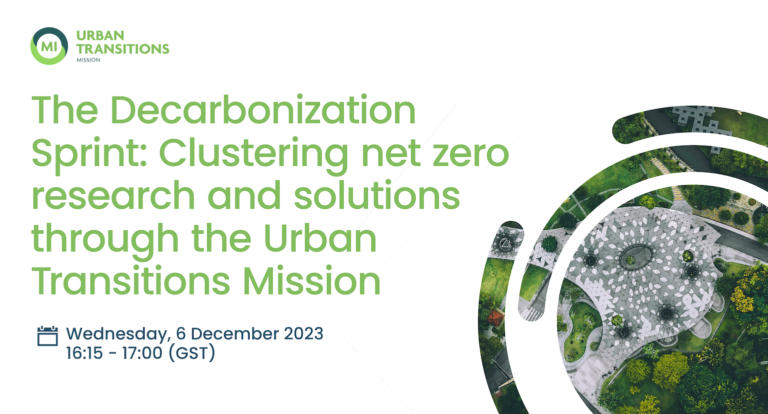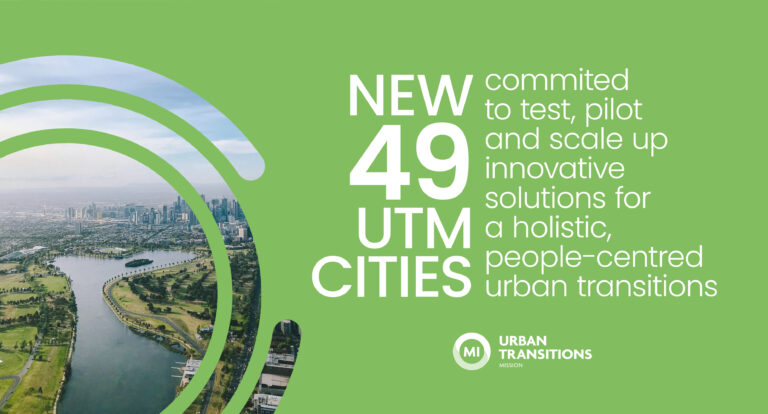Urban Transitions Mission at COP28
Driving innovative climate action towards net-zero urban transitions
At COP28, the Urban Transitions Mission took a leading in showcasing cities’ ambition and commitment for inclusive and resilient transition to net-zero. Cities took the center stage at COP28 through an unprecedented gathering of local leaders – the Local Climate Action Summit (LCAS) – held for the first time as part of the official program of a COP presidency. The past two weeks highlighted the challenges and opportunities inherent in accelerating climate action at all levels of government, with a particular emphasis on urban areas.
Our Highlights at COP28
WELCOME TO NEW CITIES JOINING THE CITY COHORT!
The Urban Transitions Mission, active during COP28, worked towards mobilizing decision-makers across all government levels, announcing the addition of 49 new cities to the UTM cohort, new partnerships and collaborations for knowledge resources and platforms, setting the path for the implementation of pilots to leverage clean energy and systemic innovation across sectors and in urban governance.
Starting in 2024, the new cities joining the UTM will be helped to strengthen their climate strategies, working together with the Global Innovation Alliance partners to prioritize projects focused on energy infrastructure, efficiency, and low-emissions built environments to build critical pathways to reach net-zero.
UTM & GOOGLE EIE COLLABORATION ON NEW GUIDE
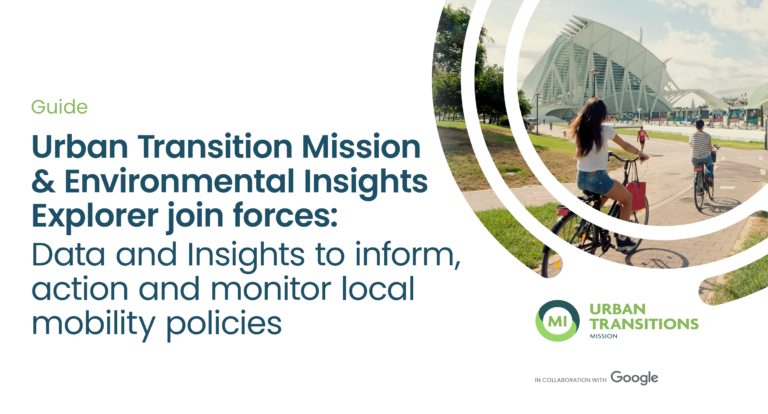
The collaboration aims to provide cities within the UTM cohort and cities globally access to invaluable insights offered by Google’s Environmental Insights Explorer (EIE), to support cities in designing, strengthening, and implementing evidence-based sustainable mobility plans and strategies through reliable data.
JOINING FORCES WITH MISSION INNOVATION’S GREEN POWER FUTURE MISSION
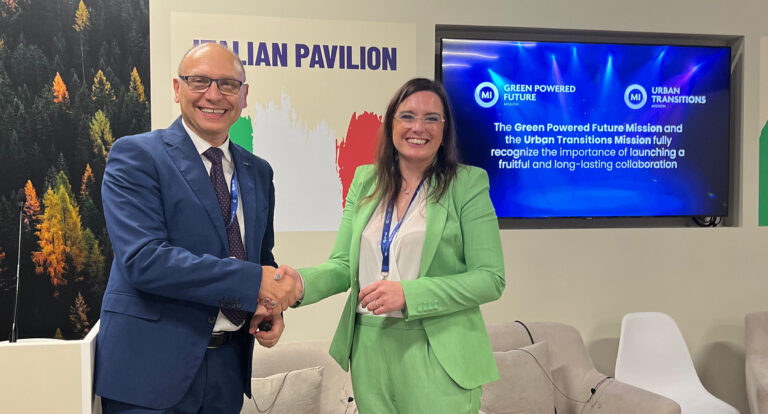
The collaboration aims to provide cities within the UTM cohort and cities globally access to invaluable insights offered by Google’s Environmental Insights Explorer (EIE), to support cities in designing, strengthening, and implementing evidence-based sustainable mobility plans and strategies through reliable data.
Insights from our network
"90% of urban emissions can be reduced through currently available, technologically feasible measures in cities, creating millions of jobs and generating trillions in revenue for urban areas and communities."

"Our goal is to be carbon neutral already by 2029. We have already reduced our emissions by nearly 60% from the 1990s level, and we are well on track. We do everything together with the universities, basing our decisions on science”

"We have a carbon neutrality roadmap and an action plan for adaptation. Both are based on science, and academia stands behind us, but is not just about having roadmaps and action plans; it is about what you do with them that really matters."

"The Urban Transitions Mission was created to address the challenges associated with city infrastructure finance, and encourages both social and policy innovation, providing space for Mayors and their teams to experiment and make use of opportunities."

"Resilient infrastructure not only withstands risks but also contributes to economic growth and development, and investing requires a systemic approach to problem-solving, including data, solutions, urban labs, integrated planning, and multi-institutional collaboration."

"The architecture of choices is vital, creating environments that support sustainable choices for both children and adults. Partnering with local universities, psychology departments, and research projects on nurturing sustainable choices is a part of our strategy."

“Being part of the city cohort allows us to address the urgent needs to build the capacity, access to the good practices and innovative solutions, establish the indicators to monitor our impact and foster investments for the implementation of net-zero pathways”

"Every city has a unique problem, and the collaboration of citizens with governments, both horizontal and vertical integration, is necessary to engage with civil society, research, and academia in bringing implementable innovative solutions”Review Text

“Addressing the challenges associated with the costs of energy transition is crucial to empower every citizen to contribute without being socially or financially overwhelmed.”

"With UTM, we are trying to broker knowledge, especially where there are gaps in understanding and research that cities need to have filled to make real progress in climate and sustainability actions."

“Cities members of the Urban Transitions Mission’s cohort are leading the way in demonstrating pathways towards resilient and people centered net-zero cities. Building on the European cities mission, the mission is raising the bar when it comes to support urban climate action, bringing together a diverse group of participants, from different levels of government and geographies, enabling a rich exchange of firsthand experiences on the implementation of financing solutions for urban climate action.”

Events at COP28
Cities on a Mission: unlocking net-zero, resilient future of urban transitions
The event emphasized the potential of UTM cities to bring co-benefits to the clean energy transition, recognizing them as a powerful tool for driving a just transition and achieving global impact. It addressed the progress and challenges remaining, particularly in financial mechanisms and communication complexities at national and subnational levels, showcasing the importance of unified efforts and discussions in unlocking solutions for a sustainable and equitable future.
On a Mission to Accelerate Urban Transitions through Innovation for Cities
Engagement with and between cities, academia, private sector for impact on climate change and generation of innovation to respond to core human needs. First results, gaps assessed and solutions explored by the Clusters will be presented and discussed in the framework of the 10 Shared priorities identified by the Urban Transitions Mission, the City Research and Innovation Agenda (CRIA) and Global Research and Action Agenda (GRAA).
Innovation Catalysts: Powering cities on a mission towards net zero
The event highlighted the collaboration between Mission Innovation’s Urban Transitions and the Green Powered Future Mission, emphasizing the need to accelerate cities’ net-zero pathways, recognizing the significant co-benefits, such as job creation and skill development, associated with a successful clean energy transition. Incentivizing habit changes, such as reducing the cost of public transport, is crucial.
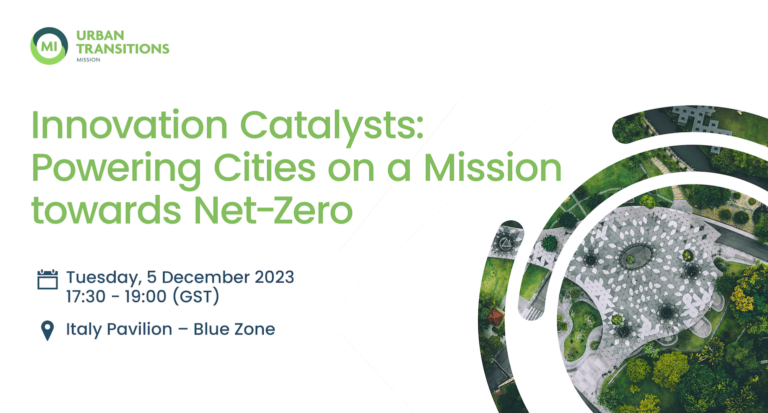
Delivering on the urban transition: multi-level partnerships and innovation responding to core human needs
Emphasizing the need for an expanded innovation space for climate action, the panel showcased solution-oriented approaches aligned with the Paris Agreement’s objectives. UTM city representatives and partners presented initial results of ongoing pilots, focusing on innovative approaches to meet core human needs. The panel also explored the role of cities as solution providers and drivers of demand for research and innovation, seeking to accelerate regulatory, technical, and financial solutions for systemic transition pathways.
The Decarbonization Sprint: Clustering net-zero research and solutions through the Urban Transitions Mission
The event showcased a commitment to a comprehensive approach to urban sustainability, leveraging the expertise and collaboration potential of both Innovate4Cities and UTM. The establishment of a collaborative platform for academics, researchers, universities, and think tanks aims to support UTM cities in their transition towards resilient and sustainable urban environments, emphasizing the importance of scalable solutions for global urban challenges.
